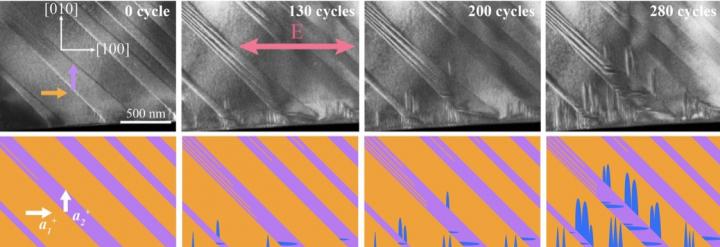The research could lead to electronics being designed with better endurance

Credit: University of Sydney
Ferroelectric materials are used in many devices, including memories, capacitors, actuators and sensors. These devices are commonly used in both consumer and industrial instruments, such as computers, medical ultrasound equipment and underwater sonars.
Over time, ferroelectric materials are subjected to repeated mechanical and electrical loading, leading to a progressive decrease in their functionality, ultimately resulting in failure. This process is referred to as ‘ferroelectric fatigue’.
It is a main cause of the failure of a range of electronic devices, with discarded electronics a leading contributor to e-waste. Globally, tens of millions of tonnes of failed electronic devices go to landfill every year.
Using advanced in-situ electron microscopy, the School of Aerospace, Mechanical and Mechatronic Engineering researchers were able to observe ferroelectric fatigue as it occurred. This technique uses an advanced microscope to ‘see’, in real-time, down to the nanoscale and atomic levels.
The researchers hope this new observation, described in a paper published in Nature Communications, will help better inform the future design of ferroelectric nanodevices.
“Our discovery is a significant scientific breakthrough as it shows a clear picture of how the ferroelectric degradation process is present at the nanoscale,” said co-author Professor Xiaozhou Liao, also from the University of Sydney Nano Institute.
Dr Qianwei Huang, the study’s lead researcher, said: “Although it has long been known that ferroelectric fatigue can shorten the lifespan of electronic devices, how it occurs has previously not been well understood, due to a lack of suitable technology to observe it.”
Co-author Dr Zibin Chen said: “With this, we hope to better inform the engineering of devices with longer lifespans.”
Observational findings spark new debate
Nobel laureate Herbert Kroemer once famously asserted “The interface is the device”. The observations by the Sydney researchers could therefore spark a new debate on whether interfaces – which are physical boundaries separating different regions in materials – are a viable solution to the unreliability of next-generation devices.
“Our discovery has indicated that interfaces could actually speed up ferroelectric degradation. Therefore, better understanding of these processes is needed to achieve the best performance of devices,” Dr Chen said.
###
DISCLOSURE:
The research was supported by the Australian Research Council for the project, Unravelling the structural origin of cyclic fatigue in ferroelectric materials. It was facilitated by the Australian Centre for Microscopy & Microanalysis at the University of Sydney.
MEDIA CONTACT:
Luisa Low, Media Adviser (Engineering), University of Sydney
+61 438 021 390 | [email protected]
Copies of the paper are available via this link.
Media Contact
Luisa Low
[email protected]
Original Source
https:/
Related Journal Article
http://dx.




